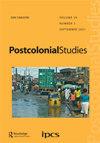Writing rights: suturing Spivak’s postcolonial and de Sousa Santos’ decolonial thought
IF 1.8
3区 社会学
Q2 CULTURAL STUDIES
引用次数: 3
Abstract
ABSTRACT Exchange between postcolonial and decolonial thought has been hampered by intellectual and political divisions despite a shared concern with decentring colonial hegemonies. Against the grain, this article brings the work of Boaventura de Sousa Santos into conversation with Gayatri C. Spivak’s, centring on one key converging issue of concern – human rights. I argue that both thinkers share what I call a ‘reluctant commitment’ to a human rights framework, while recognizing its tainted history and current instrumentalization for hegemonic imperial ends. I identify and weave together the strands that form the basis for their reluctant commitment, their critique of human rights, and their proposals for a reconfigured framework of human rights. The article maps how Spivak and de Sousa Santos aim to reconfigure a liberal human rights frame by suturing it to alternative ethical systems, including responsibility-based systems and other conceptions of dignity. It shows common patterns in their work, including their concern that binary global divisions undermine the supposed universality of the human rights framework and the risks of equating law with ethics. Tracing the deconstructive and reconstructive strategies at work in Spivak’s and de Sousa Santos’ writing helps to break down the walls between decolonial and postcolonial scholarship.写作权利:缝合斯皮瓦克的后殖民与德索萨·桑托斯的非殖民思想
后殖民主义和非殖民主义思想之间的交流一直受到知识和政治分歧的阻碍,尽管他们都对去中心化的殖民霸权感到担忧。与此相反,本文将Boaventura de Sousa Santos的作品与Gayatri C. Spivak的作品进行了对话,聚焦于一个关键的共同关注问题-人权。我认为,这两位思想家都对人权框架有着我所谓的“不情愿的承诺”,同时也认识到人权框架的污点历史和当前被霸权帝国主义目的所利用。我找出并整理了构成他们不情愿的承诺、他们对人权的批评以及他们对重新配置人权框架的建议的基础的各种线索。这篇文章描绘了斯皮瓦克和德索萨·桑托斯是如何通过将自由主义人权框架与其他伦理体系(包括基于责任的体系和其他尊严概念)相结合,来重新配置自由主义人权框架的。它显示了他们工作中的共同模式,包括他们对二元全球划分破坏人权框架的所谓普遍性以及将法律与道德等同起来的风险的关注。追溯斯皮瓦克和德索萨·桑托斯作品中的解构和重建策略,有助于打破非殖民和后殖民学术之间的壁垒。
本文章由计算机程序翻译,如有差异,请以英文原文为准。
求助全文
约1分钟内获得全文
求助全文

 求助内容:
求助内容: 应助结果提醒方式:
应助结果提醒方式:


